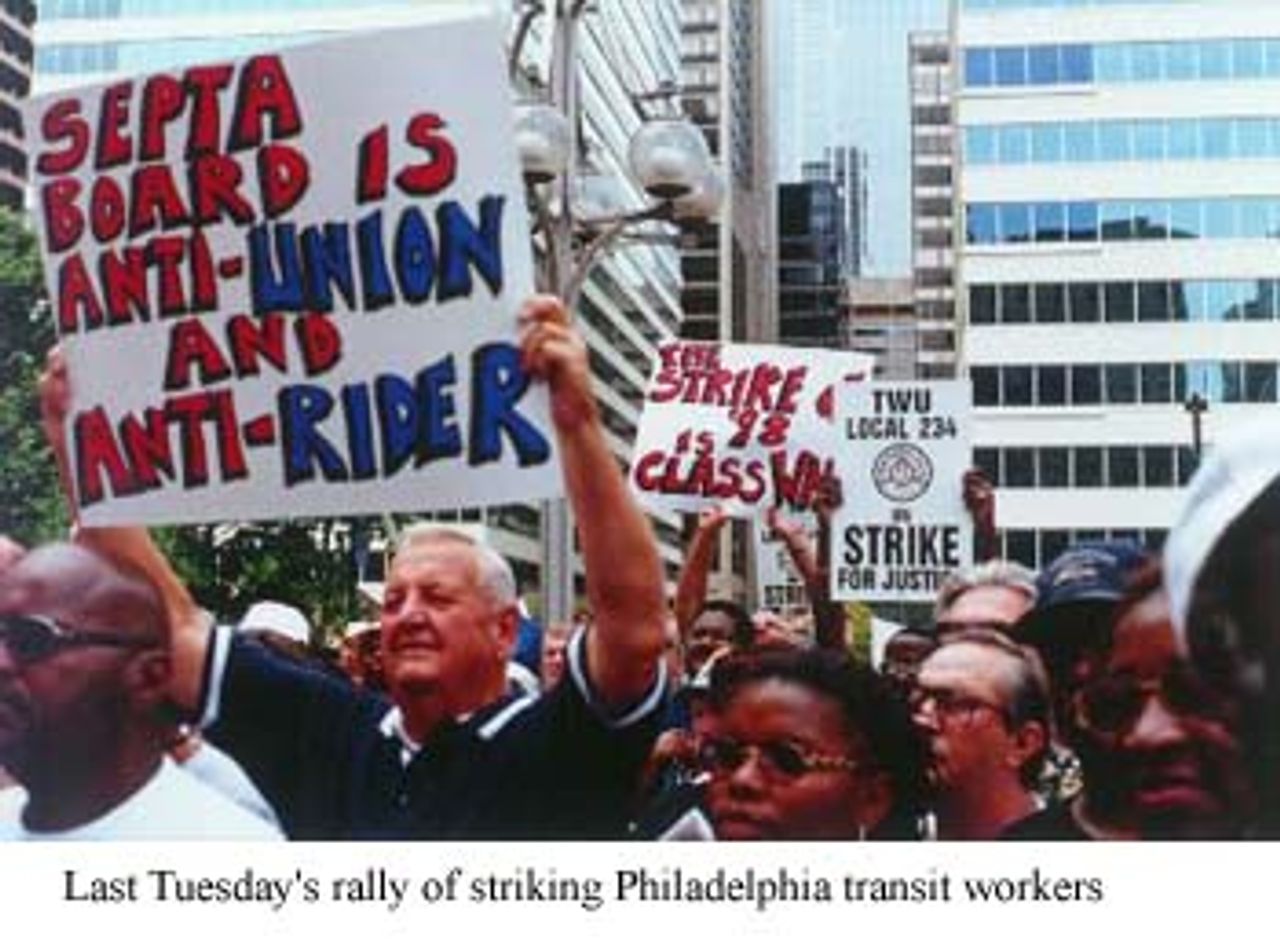 At a joint press conference Friday evening, the Southeastern Transportation Authority (SEPTA), Transport Workers Union Local 234, Mayor Ed Rendell and Philadelphia City Council President John Street announced a tentative contract and an end to the six-week strike that has shut down mass transit in the city.
At a joint press conference Friday evening, the Southeastern Transportation Authority (SEPTA), Transport Workers Union Local 234, Mayor Ed Rendell and Philadelphia City Council President John Street announced a tentative contract and an end to the six-week strike that has shut down mass transit in the city.
The walkout by 5,500 transit employees halted service for 435,000 daily passengers in the fourth largest US transit system. TWU Local 234 President Steve Brookens said at the briefing that the deal included binding arbitration on the issue of part-timers. No other provisions were announced.
The union called off the strike and ordered the workers back on the job, even though ratification will not take place for two weeks. The workers will vote on the agreement at their depots. The decision of the arbitrator on the part-time issue is not expected for four to six weeks.
Movement to a settlement accelerated after SEPTA negotiators shifted their position and indicated their willingness to submit their demand to hire part-time workers to binding arbitration. Previously, SEPTA and Mayor Rendell had opposed binding arbitration out of concern that a third party might not impose the cost-saving concessions they were seeking. From the early days of the strike, TWU officials said they would order their members back to work if the issues were submitted to binding arbitration.
At the heart of the dispute have been five key SEPTA demands:
- Part-time workers-- SEPTA wants to hire lower wage part-time workers for any task. There would be no limit on the number of part r--SEPTA wants to be free to assign work to any employee in any manner it decides; shut down any work, routes, depots or operations; to subcontract any work or services; and take whatever action it decides is in the best interests of the Authority.
- Zipper clause--SEPTA wants to be released from any prior agreements made with Local 234 or prior arbitration decisions; Local 234 would be required surrender its right to bargain over issues not included in the contract except when the contract expires.
- Assignment of work--SEPTA wants the right to assign work however it sees fit, regardless of seniority; there would be no limit on the number of reports or assignments received for extra employees; the Authority would have the right to cancel any work and reassign the operator to another run; job pickings in maintenance locations would be eliminated; whenever there is no work in a location, employees may be reassigned to another SEPTA location; employees could be cross-assigned at any time into any job; management would set productivity standards for maintenance.
- Injured on Duty--An employee who is out of work for more than six months due to an on-the-job injury would lose all contractual benefits and be fired.
In a report issued before the strike, SEPTA stated 'the inmates are in charge of the asylum,' and demanded work rule changes that have been in effect for almost 50 years. SEPTA would like to do a massive restructuring of the transit system by cutting 'unprofitable' routes, privatizing heavily traveled lines, reducing service during off-peak hours and gradually eliminating thousands of union jobs.
Democrats, union bureaucracy press for settlement
In recent weeks, local Democrats and Philadelphia AFL-CIO officials, led by Sheet Metal Workers President Tom Kelly, have pressured TWU Local 234 President Steven Brookens to end the strike. They are concerned that the continued struggle, which has won widespread support from city residents, will further expose the right-wing shift of the Democratic Party.
On Wednesday, the Wall Street Journal published an editorial urging other Democrats to follow Rendell's lead in standing up to the unions and fighting to make 'America's cities competitive again.' Rendell, the Journal said, has given the Democrats 'a piece of the urban renaissance story otherwise being written by Republicans such as Rudy Giuliani and Richard Riordan.'
After a rally of about 1,000 workers on Tuesday, strikers and supporters marched through Center City streets to SEPTA offices, chanting, 'They're wheelin', and dealin', and doin' a whole lot of stealin'!' and 'No contract, No peace!' Under the watchful eye of the mayor's police department they held spirited rallies shouting, 'Mayor Rendell, go to hell!'
The World Socialist Web Site spoke with strikers at Tuesday's rally. Shwana Dogan, a bus operator, said, 'The big issues are part-timers and what they call managers' rights. They want to change work rules so SEPTA has unlimited authority to discipline workers. They want to take away arbitration rights. If you have a serious injury, they want you to lose all benefits and go on disability. That means when you come back to work they could assign you to any job. It doesn't look good. I think we should get binding arbitration so we can work while they work it out.'
Another bus operator said, 'I think it's a shame. They're just trying to break the union. They don't want a middle class, just a first class and a bottom class. We'll never accept part-timers or so-called managers' rights. If you let part-timers in here, I'll be out of work in six months. To me, that makes it worth it to stay out here.'
R. Sanborn, a cashier, said, 'We don't know what's going on. It seems like a stalemate. The union sent us a letter saying SEPTA still wants managers' rights, and for us to lose benefits after being out six months for an injury. I don't have a clue what should be done, but I'm not going back with part-timers. My pension depends on overtime.'
See Also:
Wall Street wants settlement that facilitates GM downsizing
[10 July 1998]
The media and the New York City construction workers' protest
[7 July 1998]
